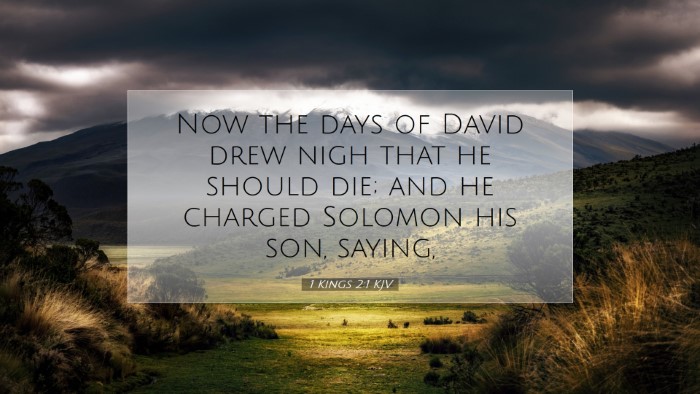Commentary on 1 Kings 2:1
Verse Text: "Now the days of David drew nigh that he should die; and he charged Solomon his son, saying,"
Introduction
This verse marks a pivotal moment in the narrative of the Old Testament, capturing the transfer of leadership from David to Solomon. It encapsulates the final days of David's life, a time of reflection, counsel, and preparation for the next generation. The significance of this transition is echoed throughout scripture, providing vital lessons for both leaders and followers in faith.
Contextual Background
The book of 1 Kings begins with an account of the ascension of Solomon to the throne of Israel. David's life was marked by numerous trials, triumphs, and significant achievements. His final moments resonate with a paternal concern for Solomon, as well as an exhortation to uphold God's ways. Understanding the historical and cultural context is essential for a comprehensive interpretation of this verse.
Insights from Notable Commentators
Matthew Henry's Commentary
Matthew Henry emphasizes the solemnity of David’s dying moments. He notes that this passage is indicative of David's awareness of the time of his death and his desire to impart wisdom to Solomon. Henry asserts that the charge given is not merely paternal but deeply rooted in a spiritual legacy. David reminds Solomon of his responsibilities to God, highlighting the importance of covenant faithfulness.
- Leadership Transference: Henry points out that David's instructions are an essential part of nurturing righteous leadership.
- Divine Fidelity: He underscores the significance of remaining loyal to God’s commandments as the cornerstone of a successful reign.
- Prayerful Guidance: Henry suggests that the charge is infused with a prayerful spirit, encouraging those in leadership to seek divine guidance in their decisions.
Albert Barnes' Commentary
Albert Barnes provides a detailed analysis of the phrase "charged Solomon his son." He elaborates on the import of David's words, framing them as both counsel and condemnation for neglecting divine principles. Barnes affirms that David was fully aware of the challenges Solomon would face and sought to prepare him spiritually and morally for leadership.
- Honoring God: Barnes stresses that leadership is fundamentally about honoring God. Solomon's future success hinges on his dedication to divine law.
- Legacy of Instruction: Barnes highlights the importance of legacy, encouraging parents and leaders to impart wisdom to the next generation.
- Challenges Ahead: He notes that Solomon would need strength and wisdom, which would only come through a close relationship with God.
Adam Clarke's Commentary
Adam Clarke provides a profound theological reflection on the responsibilities of a monarch. He emphasizes David's role not just as a father, but as a spiritual guide. Clarke suggests that David's instructions are multifaceted, covering personal conduct, adherence to God’s laws, and governance of the people.
- Moral Integrity: Clarke points to the necessity of moral integrity in leadership, asserting that Solomon's character will influence the nation's welfare.
- Faithful Service: He encourages leaders to remain diligent in their duties to both God and their constituents.
- Intergenerational Wisdom: Clarke underscores how David’s final words exemplify the importance of preserving godly wisdom through generations.
Theological Applications
The implications of this verse extend far beyond its historical context. For pastors, students, theologians, and Bible scholars, several key themes emerge:
-
The Importance of Mentorship: Leaders are called to actively mentor and invest in the next generation, ensuring the continuation of God’s work.
-
Leadership Rooted in Prayer: Just as David’s charge was prayer-infused, contemporary leaders must seek divine guidance in their decision-making processes.
-
Commitment to God’s Laws: The call to uphold righteousness remains pertinent, urging leaders to act with integrity and fidelity to God’s commands.
-
Intergenerational Transfer of Faith: This verse serves as a reminder of the importance of sharing one’s faith and experiences with the younger generation.
Conclusion
In 1 Kings 2:1, we witness the concluding chapter of King David’s life as he offers final instructions to Solomon. This moment is not only significant as a historical transition but also serves as a theological reflection on leadership, legacy, and faithfulness to God. The insights from esteemed commentaries help us understand the depth of this charge and its relevance for modern faith communities. As leaders today reflect on their responsibilities, the exhortations from David serve as invaluable guidance for navigating the complexities of leadership amid a rapidly changing world.


